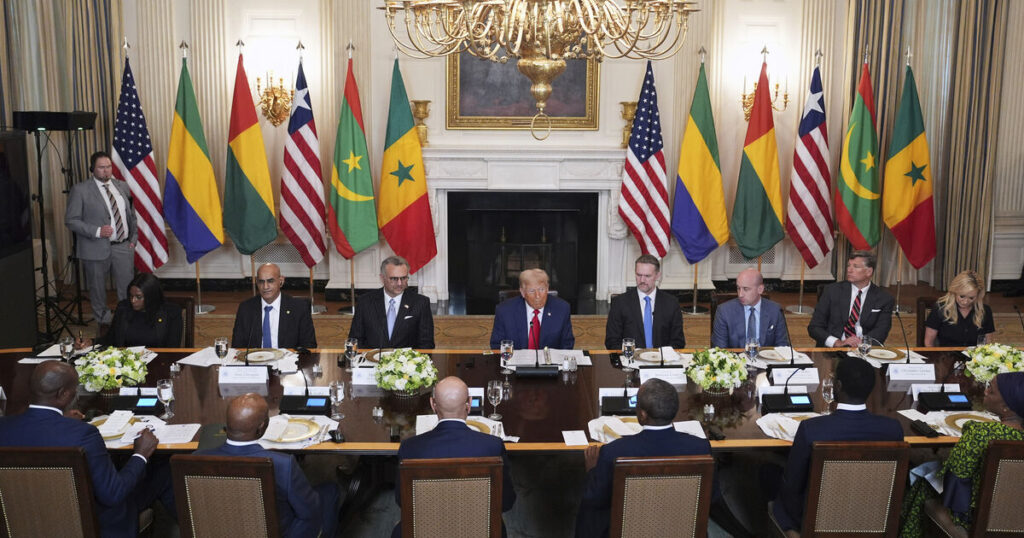There was confusion and anger in Liberia on Thursday after US President Donald Trump praised the English skills of President Joseph Boakai.
“Such good English,” Mr. Trump said to Mr. Boakai, with visible surprise.
“Such beautiful English.”
English has been the West African nation’s official language since the 1800s.
But Mr. Trump did not stop there.
“Where did you learn to speak so beautifully?” he continued, as Mr. Boakai murmured a response.
“Where were you educated? Where? In Liberia?”
The exchange took place during a meeting in the White House between Mr. Trump and five West African leaders on Wednesday, amid a pivot from aid to trade in US foreign policy.
Liberia has had deep ties with the United States for centuries.
The country was first established with the aim of relocating freed slaves from the United States.
Foday Massaquio, chairman of the opposition Congress for Democratic Change-Council of Patriots, a Liberian political group, said that while the remarks were typical of Mr. Trump’s engagement with foreign leaders, what some saw as a “condescending” tone was amplified by the fact that the leaders were African.
“As a matter of fact, it also proves that the West is not taking us seriously as Africans,” he said.
“President Trump was condescending, he was very disrespectful to the African leader.”
Kula Fofana, spokesperson for Mr. Boakai’s office, told The Associated Press: “I believe that as journalists, it is important to focus on the substantive discussions at the summit.”
Sara Beysolow Nyanti, Liberia’s foreign minister, said on X that “President Trump’s comment on Boakai’s ‘beautiful English’ simply acknowledged Liberia’s familiar American-rooted accent and no offense was taken”.
As I shared w/ @CNN https://t.co/tr4mvEx9Wr, our linguistic heritage is deeply American‑influenced, & this was simply recognized by @realDonaldTrump. We remain committed to strengthening Liberia‑U.S. ties, built on mutual respect, shared values, and meaningful partnership. (2/2)
— Mme. Sara Beysolow Nyanti (@NyantiSara)
July 10, 2025
“Our linguistic heritage is deeply American‑influenced, & this was simply recognized by @realDonaldTrump. We remain committed to strengthening Liberia‑US ties, built on mutual respect, shared values, and meaningful partnership,” the minister said.
But for others Mr. Trump’s comments added to the sense of betrayal which became palpable in Liberia in recent months.
Earlier this month, US authorities dissolved the US Agency for International Development (USAID) and said it was no longer following what they called “a charity-based foreign aid model”.
That decision sent shockwaves across Liberia, where American support made up almost 2.6% of the gross national income, the highest percentage anywhere in the world, according to the Centre for Global Development.
Liberians thought they would be spared from Mr. Trump’s cuts because of the countries’ close relationship.
Their political system is modelled on that of the US, along with its flag.
Liberians often refer to the US as their “big brother”.
Liberia was one of the first countries to receive USAID support, starting in 1961.
The street signs, taxis and school buses resemble those in New York.
“In the first place, Liberia is a long-standing friend of the USA, therefore Mr. Trump should have understood that we speak English as an official language,” said Moses Dennis, 37, a businessman from Monrovia.
He added that Mr. Boakai did not go to Washington for “an English speaking competition”.
His views were echoed by Siokin Civicus Barsi-Giah, a leadership expert and a close associate of former president George Weah.
“Liberia is an English-speaking country,” he said.
“Former slaves and slave owners decided to organise themselves to let go of many people who were in slavery in the United States of America, and they landed on these shores now called the Republic of Liberia.”
For him, the exchange was “condescending and ridiculing”.
He added: “Joseph Boakai was not praised. He was mocked by the greatest president in the world, who is leading the greatest country in the world.”
Some however said that given Mr. Trump’s personal style, Wednesday’s remarks were meant as praise.
“To some, the comment may carry a whiff of condescension, echoing a long-standing Western tendency to express surprise when African leaders display intellectual fluency,” said Abraham Julian Wennah, the director of research at the African Methodist Episcopal University.
“In post-colonial contexts, language has long been weaponised to question legitimacy and competence.”
But if one looks at Mr “Trump’s rhetorical style”, these remarks were “an acknowledgment of Boakai’s polish, intellect, and readiness for global engagement”, he said.


